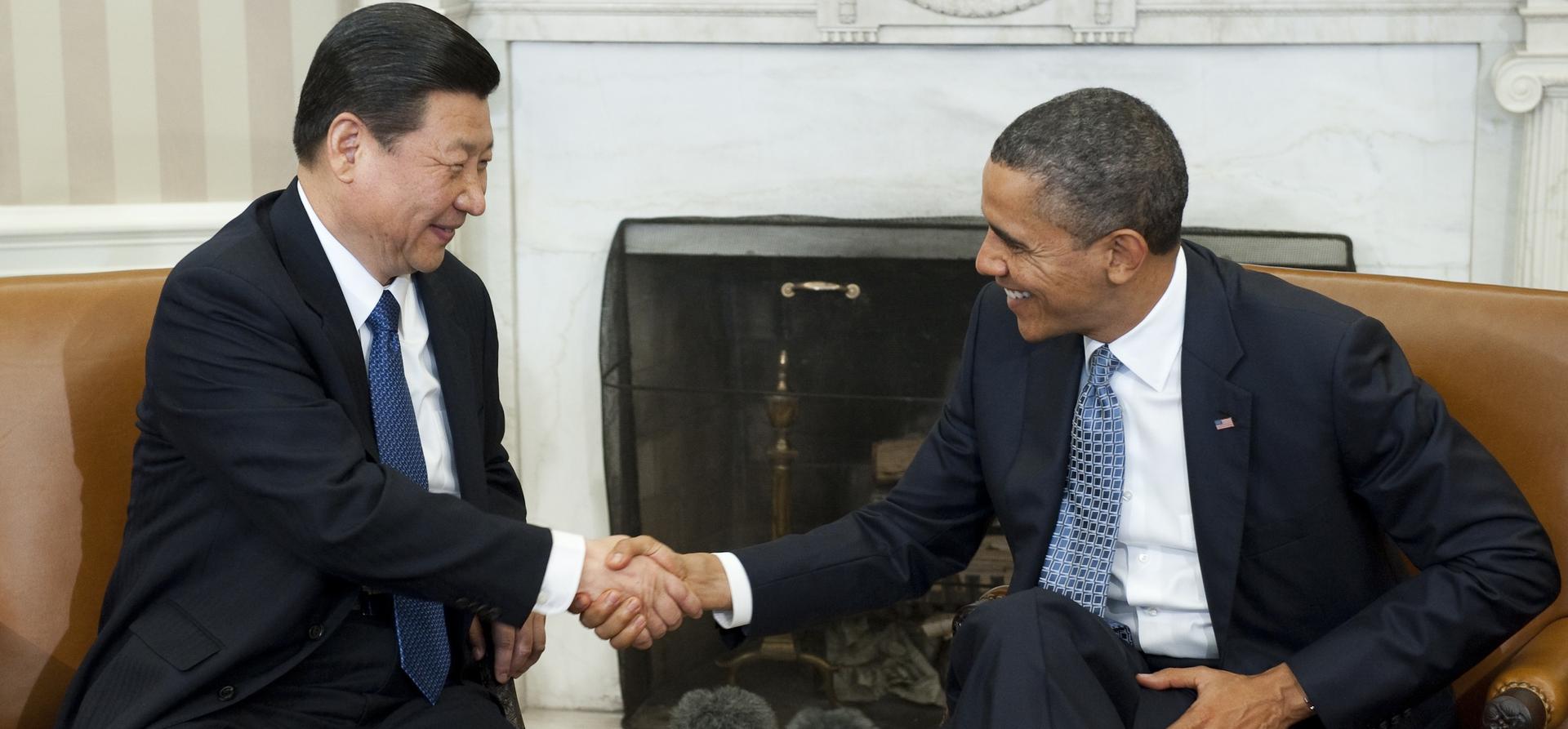Obama, Xi Jinping meeting: 5 pressure points
US President Barack Obama shakes hands with his Chinese counterpart Xi Jinping, who was then China’s vice president in his February 2012 visit to Washington.
When President Xi Jinping meets President Barack Obama on Friday in California, it will be a rare move for the Chinese.
According to one longtime observer, all other Chinese leaders have made Washington the destination for their first appearances inside the United States.
That’s significant, former National Security Council senior director Jeffrey Bader says, because it proves Xi, who took office in March, is a more relaxed figure than his predecessors.
It might also mean a more promising future for China-US relations, Bader told the Wall Street Journal.
“Xi does not want a negative relationship with the US to be diverting attention from or complicating the economic reform agenda he is expected to announce later this year,” said Bader, a Brookings Institution senior fellow.
“So he wants to get off to a good start with President Obama, and to do it sooner rather than later.”
That’s also encouraging, since the agenda they’re likely to discuss is packed with high-pressure issues. Here’s what the two leaders might debate at the “shirt-sleeves summit.”
Cyber-spying
This is especially complex today given recent revelations of a court-approved domestic surveillance program that enabled the US government to snoop on vast numbers of its own citizens, including their internet use.
While Obama will likely press China for answers about alleged cyber-spying on the US and its businesses — including weapon designs — he’ll probably also face questions from reporters about Washington's tactics.
It’s come to light the National Security Agency has tracked phone, internet and credit card purchase records of millions of users in the United States in the name of homeland security.
While China has denied spying on the US, Obama is looking for assurances Xi takes the matter seriously.
“We expect this to become a standing issue in the US-China relationship, given the importance of cyber-security to the global economy,” a White House official told reporters this week in previewing the meetings.
“Frankly, [that] means dealing with actions emanating from within your territory, so that if there are cyber threats emerging from within another country that pose a risk to US businesses, we're going to raise that.”
Foreign policy
Namely, North Korea and Syria.
Quieting North Korea’s nuclear bluster is as important to China as it is to the United States, former Assistant Secretary of State Kurt Campbell told CNN.
China is growing weary of the Hermit Kingdom’s nuclear tests igniting tension in Asia, he said.
“They [Chinese officials] recognize that the steps that they [North Koreans] have taken — nuclear provocations — are creating the context for more military activities on the part of the United States and other countries that ultimately are not in China's best strategic interests,” said Campbell, who worked in East Asian and Pacific affairs.
China has also blocked United Nations Security Council resolutions aimed at ending Syria’s two-year civil war, and Obama might look to Xi for commitment to a quick resolution, BBC said.
Human rights
While the administration has carefully plotted this first meeting to befriend Xi, a White House representative told The New York Times that human rights are on the agenda.
ChinaAid, a Christian organization based in Texas, hosted a briefing with escaped political activist Chen Guangcheng on Thursday that called on Obama to press for the release of 16 jailed Chinese activists.
“The 'China 16' represent the diversity of groups but not all that have been persecuted in China including Tibetans, Uyghurs, Christians, Falun Gong practitioners, pro-democracy advocates, human rights lawyers,” activist group ChinaAid chairman Chris Smith says online.
South China Sea
Territorial claims and fishing disputes enflamed China’s relationships last year with its South China Sea neighbors like Japan, the Philippines and Vietnam.
Obama and Xi this weekend are likely to discuss how a peaceful, prosperous Asia benefits US-China ties, Kenneth G. Lieberthal writes for the Brookings Institution.
“Such a dialogue might mitigate current pressures trending toward an arms race in the region,” Lieberthal says.
Economics
For his part, Xi might look to Obama for answers about China’s claims that Chinese companies trying to purchase American firms are facing discrimination.
China is also facing increased economic pressures at home such as mounting unemployment, which might frame Xi’s priorities for the meetings.
“The summit is essential for Xi to consolidate his power back home, and for Obama to help Xi to choose the right path for China and to be on the right side of history,” US-China expert Cheng Li told the Washington Post.
This is Xi's first meeting with Obama since taking office in March, although the two met last February in Washington, DC, when Xi was vice president.
The California summit is being held near Palm Springs at the 200-acre Sunnylands estate, The Associated Press said.
They’ll meet Friday late afternoon and over dinner, after Obama attends a health care event and Democratic fundraiser earlier in the day in Northern California.
More meetings are set for Saturday.
More from GlobalPost: Chinese upbeat on Obama ahead of summit
Every day, reporters and producers at The World are hard at work bringing you human-centered news from across the globe. But we can’t do it without you. We need your support to ensure we can continue this work for another year.
Make a gift today, and you’ll help us unlock a matching gift of $67,000!
